
James William Anderson III, known professionally as Bill Anderson, is an American country music singer, songwriter, and television host. His soft-spoken singing voice was given the nickname "Whispering Bill" by music critics and writers. As a songwriter, his compositions have been covered by various music artists since the late 1950s, including Ray Price and George Strait.
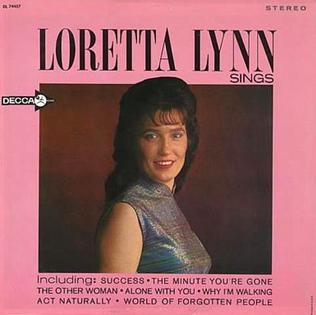
Loretta Lynn Sings is the debut studio album by American country singer-songwriter Loretta Lynn. It was released on December 9, 1963 via Decca Records and was produced by Owen Bradley. The album contained songs recorded shortly after she had signed with the Decca label. In total, four singles were released from the album. Two of these singles became major hits on the Billboard country chart. This included "Success", which became Lynn's first top ten hit. The album was received positively by critics and writers alike.
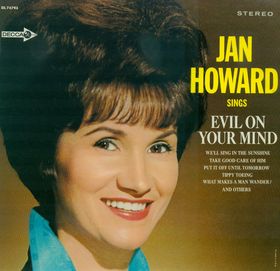
Jan Howard Sings Evil on Your Mind is a studio album by American country artist, Jan Howard. It was released in July 1966 via Decca Records and contained 12 tracks. It was the second studio album of Howard's music career and her first with the Decca label. The disc combined new recordings with cover tunes. Among its songs was the title track, which was one of the four singles included on the album. It became top five single on the American country chart in 1966 while the album itself reached the top ten of the American country albums chart around the same time.

Rock Me Back to Little Rock is the tenth studio album by American country artist Jan Howard. It was released in June 1970 on Decca Records and was produced by Owen Bradley. The album featured two singles, one of which became a top 20 hit on the Billboard country chart. Additionally, the album would reach peak positions on the Billboard country albums chart.

Bill and Jan (Or Jan and Bill) is a studio album released by American country artists Bill Anderson and Jan Howard. It was released in January 1972 on Decca Records and was produced by Owen Bradley. It was the duo's third collaborative album together and featured singles that became hits on the Billboard country chart. The album itself would also chart on the Billboard country albums list in 1972.
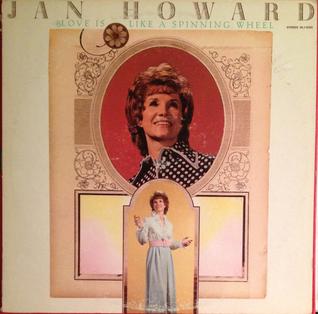
Love Is Like a Spinning Wheel is the twelfth studio album by American country artist Jan Howard. It was released in March 1972 on Decca Records and was produced by Owen Bradley. The album spawned two singles that became minor hits on the Billboard country songs chart. It was one of Howard's final studio albums for the Decca label before departing the label within a year's time.
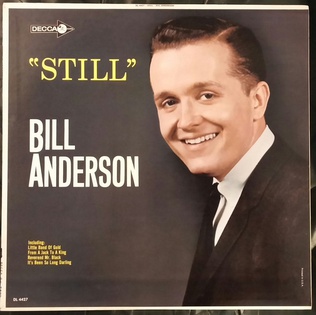
Still is a studio album by American country singer-songwriter Bill Anderson. It was released on June 17, 1963 on Decca Records and was produced by Owen Bradley. Still was Anderson's debut studio album as a recording artist after recording several singles for the Decca label. Two singles were included in the album. Its most successful was the title track, which became a crossover hit in 1963. It reached positions on the Billboard country, pop and adult contemporary charts. The album itself would also reach peak position on Billboard charts.
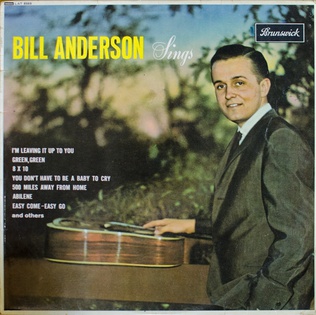
Bill Anderson Sings is a studio album by American country singer-songwriter Bill Anderson. It was released in February 1964 on Decca Records and was produced by Owen Bradley. The album was Anderson's second studio release as a recording artist and included two singles that became major hits on the Billboard country chart. The album itself would also reach positions on the Billboard charts following its release.
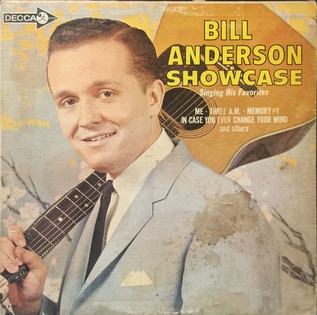
Showcase is a studio album by American country singer-songwriter Bill Anderson. It was released in November 1964 on Decca Records and was produced by Owen Bradley. The album was Anderson's third studio release as a recording artist and second to be released in 1964. It included two singles that became major hits on the Billboard country chart along with subsequent B-sides.

I Can Do Nothing Alone is a studio album by American country singer-songwriter Bill Anderson. It was released in June 1967 on Decca Records and was produced by Owen Bradley. It was Anderson's seventh studio record and his first album to consist entirely of gospel music. Although the album did not produce any singles, it made peak positions on the Billboard country albums chart.

Wild Weekend is a studio album by American country singer-songwriter Bill Anderson. It was released in May 1968 on Decca Records and was produced by Owen Bradley. The record was Anderson's ninth studio release to be issued during his recording career. It reached peak positions on the Billboard country albums chart and also produced two singles that became major hits.
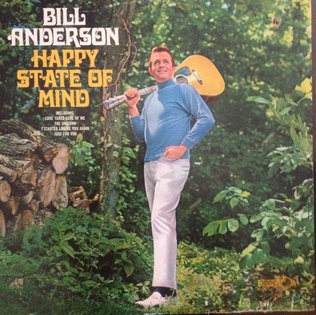
Happy State of Mind is a studio album by American country singer-songwriter Bill Anderson. It was released in September 1968 on Decca Records and was produced by Owen Bradley. Anderson's tenth studio recording, it was also his second studio album released in 1968. Among the songs included on the release was the title track, which became a major hit in both the United States and Canada.
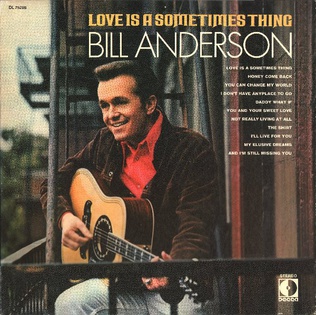
Love Is a Sometimes Thing is a studio album by American country singer-songwriter Bill Anderson. It was released in June 1970 on Decca Records and was produced by Owen Bradley. It was Anderson's fourteenth studio album since signing with the Decca label in 1958. Its only single, the title track, would become a major hit on the Billboard country chart in 1970. The album itself would also reach peak positions on the country albums chart following its release.

Always Remember is a studio album by American country singer-songwriter Bill Anderson. It was released in April 1971 on Decca Records and was produced by Owen Bradley. His sixteenth studio effort, it was also Anderson's only studio album to be released in 1971. The title track became a single and a top ten hit on the Billboard country chart. The album would also reach peak positions on the albums chart too.
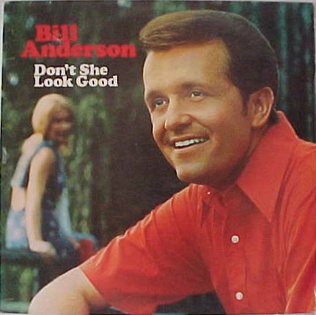
Don't She Look Good is a studio album by American country singer-songwriter Bill Anderson. It was released in November 1972 on Decca Records and was produced by Owen Bradley. The album was Anderson's twentieth studio recording to be issued. It was also his fourth studio album released in 1972. Two additional projects were collaborations with Jan Howard earlier in the year. The album's only single was the title track, which became a major hit on the country charts.
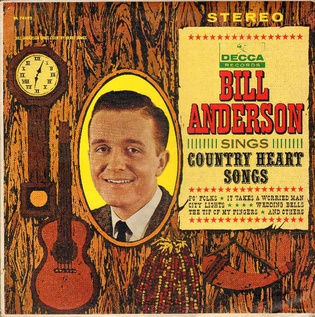
Bill Anderson Sings Country Heart Songs is a compilation album by American country singer-songwriter Bill Anderson. It was released in January 1962 on Decca Records and was produced by Owen Bradley. Despite it being a compilation, the project was Anderson's debut album release as a recording artist. It featured several of his early hits with the Decca label and included one song that would later be issued as a single in 1962.

Bill Anderson's Greatest Hits is a compilation album by American country singer-songwriter Bill Anderson. It was released in October 1967 via Decca Records and was produced by Owen Bradley. The album was Anderson's third compilation recording released in his career and first album of greatest hits. Twelve tracks were included on the collection that had been previously released. The album itself also reached major record chart positions.
"Three A.M." is a song written by Bill Anderson and Jerry Todd. It was first recorded by its co-writer, Bill Anderson. It was released as a single in 1964 via Decca Records and became a major hit.
"All the Lonely Women in the World" is a song written and recorded by American country singer-songwriter Bill Anderson. It was released as a single in 1972 via Decca Records and became a major hit the same year.
"Don't She Look Good" is a song written by Jerry Chesnut that was recorded by American country singer-songwriter Bill Anderson. It was released as a single in 1972 via Decca Records and became a major hit the same year.

















